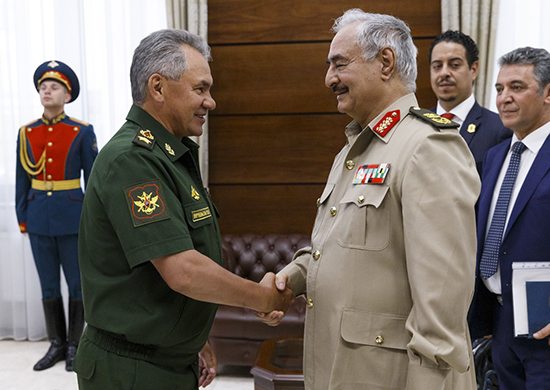 Photo courtesy of: Ministry of Defense of the Russian Federation
Photo courtesy of: Ministry of Defense of the Russian Federation
The U.S. Lacked a Plan on Libya, Russia Stepped In
As Libya continues to struggle to achieve stability and a functional democracy, Russia has increased its influence in the country while, after the 2011 intervention, the U.S. has taken a back seat. In February 2011, violent protests opposing Muammar Qaddafi and his regime broke out in Benghazi, spreading to other major cities. This led to clashes between rebels and government forces. It was largely agreed upon in the international community that Qaddafi’s use of force against the Libyan people was a violation of human rights. When the situation saw little improvement, the U.N. Security Council approved resolution 1973, authorizing “all necessary measures” short of an occupying force to protect Libyan civilians. The resolution passed because the other members assured Russia that the goal was to protect Libyan civilians, bring down Qaddafi. This harmed the credibility of the U.S., U.K., and France, causing Russia to become more distrustful of Western countries.
After the rebels overthrew Qaddafi and his regime, there were a number of transfers of power between 2012 and 2015. In 2012, the Libyan House of Representatives (HoR) was elected and serves as the current legislative branch and is supported by the Libyan National Army under General Khalifa Haftar. The Government of National Accord (GNA), formed through an U.N. agreement signed in 2015, is internationally recognized. The HoR refuses to see the GNA as legitimate, creating a power struggle.
Thus far, President Trump’s administration has lacked a coherent plan on Libya, saying the U.S.’ only role should be counterterrorism measures. The absence of Western influence gave Russia the opportunity to expand its influence. Russia is covertly supporting General Haftar and the HoR by printing money for the Central Bank of Libya and providing military advisors and intelligence officers. Egypt and the United Arab Emirates assist Russia in foregoing the arms embargo and provide military training to the Libyan Army.
While supporting Haftar, there are actions Russia will not pursue in order to prevent criticism from the international community. After meeting with Russian Defense Minister Sergei Shoigu, Haftar claimed President Vladimir Putin would help lift the arms embargo put in place by the U.N. Mattia Toaldo, a fellow at the European Council for Foreign Relations says Russia is unlikely to make an effort to do this because it would harm Russia’s chances of being involved in rebuilding a post-civil war Libya.
To minimize the risks, Russia has also engaged in talks with the GNA and publicly approves the U.N.’s peacemaking efforts, so it can easily switch sides claiming its always shown support for the GNA, should Haftar become a ‘second Qaddafi’. Additionally, its attempt to act as a mediator between the conflicting factions will nearly guarantee Russia’s involvement in post-war negotiations. Ultimately, Russia wants to help bring stability to the region and form a central government that favors its interests to form arms contracts, energy deals, and a railway project. Moreover, Russia wants to prove, to both the world and its people, that it can fix a problem that it sees the U.S. as having created.
Last July, CNN reported on a potential new policy for Libya. It would further the goal of supporting a resolution between the conflicting factions, could lead to reopening the U.S. embassy, establish new intelligence sharing efforts between U.S. special operations forces and Libyan officials, and help train Libyan forces.
The primary interests of the U.S. in Libya include protecting its allies, preserving fledgling democracies in North Africa, protecting its investment in the country thus far, and preventing the spread of the Islamic State. The U.S. should avoid direct military involvement outside of counterterrorism strikes, be more vocal about its support for stable democratic systems, and assist European nations in playing a greater role in gaining that stability. Reestablishing a diplomatic presence should also be carefully considered and balanced against security risks, as it would show the U.S.’ commitment to working towards stabilization. To improve security in Libya and protect Europe from the emanating threats, more emphasis needs to be put on dismantling criminal networks that benefit from the migration crisis and empower terror groups.
As Russia has also devoted time, money, and additional aid to Haftar it will be more forceful in maintaining its influence in Libya. Europe, alongside the U.S., may be able to work in cooperation with Russia, using its influence to negotiate a political agreement between Haftar and the GNA to establish stability. Involving Russia and giving it the ability to secure some of its interests may help work towards creating a functional and stable central government in Libya.





